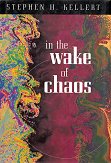There has been a great advance in the study of chaos theory in the last few decades, changing our way of looking at some parts of the universe. What are the philosophical consequences?
In this slim volume, Stephen Kellert gives a whirlwind tour of some of the important philosophical questions that chaos theory might illuminate. After an excellent introductory chapter -- a concise summary of the physical theory under examination (I could have done with a second introductory chapter, on the relevant bits of philosophy being explored) -- he discusses what chaos theory means for predictability and impossibility, how determinism and predictability are no longer the same thing, what it means to "understand" something, and just why it took so long for chaos theory to become a discipline in its own right, even though the prerequisites have been available most of the century.
Like most philosophers, he is more interested in questions than answers. But the questions are worth exploring. I was particularly interested in the last chapter, on why linear physics has held such a dominant position for so long (I have always assumed it was merely because non-linear physics was just too difficult) -- Kellert has an interesting discussion about the link between physics and engineering.
